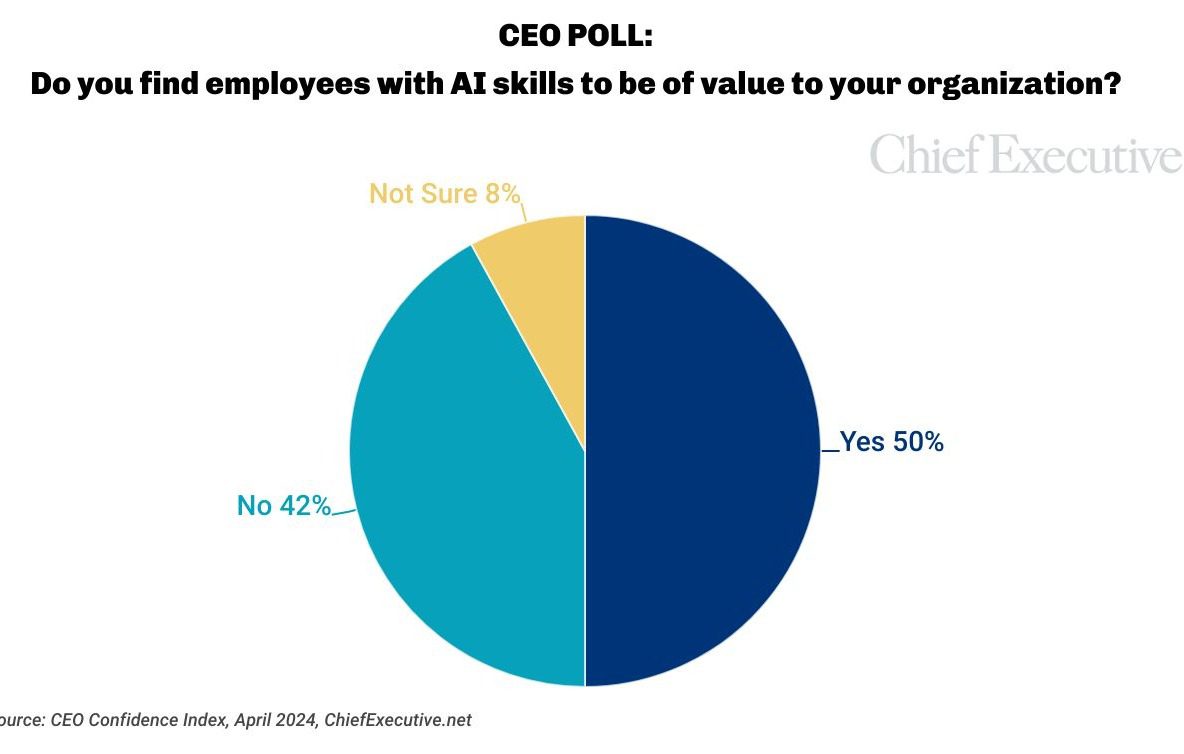If you ask chief executives what they think of generative AI for their business, you’ll be hard-pressed to identify a central theme. There are some sector-specific areas of success—manufacturing companies, for instance, are much more advanced in their application of the AI technology than professional services companies, for example.
Overall, however, our data shows a slow pace of adoption. The CEOs—and CFOs—we surveyed describe “exploring the space” and “keeping an eye on what develops.” Few report having jumped in with both feet. So we surveyed business leaders to ask why—and what they plan to do about it. Here are some highlights from the research.
A Productivity Boost
The proportion of CEOs showing interest in leveraging GenAI capabilities has been on the rise since the technology emerged in the fall of 2022—more than doubling in 2023, from 23 percent at the beginning of the year to 53 percent by the fourth quarter.
Interest in understanding how the technology can help grow their business is spreading. But a year and a half since the release of OpenAI’s ChatGPT, CEOs polled in April 2024 report that productivity gains are the main value-add they have been able to unlock so far. Those heralded innovation boosts ranked nearly last on the list, with only 9 percent of CEOs saying they’ve been able to develop new products and services as a result of using GenAI.
The challenge in finding valuable ROI doesn’t mean CEOs are ready to abandon the technology, though. Most say they still see opportunities where GenAI could, in the future, help them improve data and reporting, workforce productivity, marketing and communications, as well as customer service and support. For now, however, the focus appears to be on marketing—and primarily content development support.
“We’re using GPT to help write copy for emails, marketing, blog posts,” says the CEO of a recruitment and staffing agency in California, echoing many others who mentioned using GenAI for brainstorming and drafting communications.
That’s because the technology hasn’t evolved to serious business cases just yet, says Dennis A. Robertson, president and CEO of technology consultancy Robertson & Associates, and the former chief technology officer of Motorola and former chair of the Federal Communications Commission Technical Advisory Council. “It is somewhat useful for routine communications if you are very careful in using it, but not useful for serious work,” he says.
Finance is one area where CEOs see little opportunity for the time being. And CFOs don’t disagree. When we asked finance chiefs about GenAI as part our sister publication StrategicCFO360’s second-quarter CFO Confidence Index, conducted in collaboration with BlackLine last May, we found 68 percent of CFOs had yet to find finance-related uses for generative AI. For now, they said, the most common uses of GenAI for finance are in performance reporting and analytics (45 percent) and forecasting (38 percent).
When asked why the pace of adoption has been relatively slow—if we can call 18 months since inception “slow”—CEOs and CFOs alike say the risks are too high. From the introduction of errors and inaccurate data to IP rights issues and looming regulations, the hundreds of leaders we polled on this issue are concerned about using the technology’s open-source data.
“GenAI has a lot of promise,” says the CFO of a large government agency, “but governance, risk, controls and security issues are preventing its adoption outside of specialized use cases. It is still black-box tech that is hard for business leaders to trust.”
“AI can be a valuable tool to improve efficiency, but it remains subject to biases of the original programmers,” adds the CFO of a next-generation, tech-focused production studio. “This becomes one of the most critical points of evaluation of the AI program. Biases have the ability to create unexpected or false results and unintended outcomes.”
The problem with this, says Kathy Mast, president and CEO of NeuvoNow and a C-level consultant on technology and innovation, is that the technology is already out there, and companies can’t be complacent about using it. “Some leaders are saying it’s too early for AI,” she says, “but your staff is already engaging with it, so get help, create an initial policy and guidance for use. Be a leader in its effective and responsible use.”
WHO’S MINDING THE AI TREND?
Overall, companies are divided about where to place the responsibility of AI inside the organization.
27% have made it everyone’s responsibility to unlock potential areas of value
20% have placed the AI strategy responsibility on the tech team specifically
18% have placed it on their product development team
16% say they’ve crafted a specific team with select individuals to take charge of AI
One observation noted from the data Chief Executive collected from CEOs in April 2024 is that a greater number of large companies ($100M+) seem to be actively pursuing GenAI uses, compared to their smaller counterparts: 54 percent vs. 19 percent.
Smaller companies also tend to place the responsibility of finding AI value on everyone in the organization, more so than larger companies (37 percent vs. 15 percent). Instead, at larger companies, the AI strategy has been placed on either a specially crafted team of individuals inside the company (26 percent) or the tech team (22 percent).
Nevertheless, across all sizes, most companies say that when it comes to using AI, they are just getting started.








